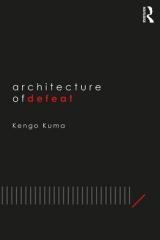Kengo Kuma, one of Japan's leading architects, has been combining professional practice and academia for most of his career. In addition to creating many internationally recognized buildings all over the world, he has written extensively about the history and theory of architecture. Like his built work, his writings also reflect his profound personal philosophy.
Architecture of Defeat is no exception. Now available in English for the first time, the book explores events and architectural trends in the twentieth and twenty-first centuries in both Japan and beyond. It brings together a collection of essays which Kuma wrote after disasters such as the destruction of the World Trade Center in New York City on 9/11 and the earthquake and tsunami that obliterated much of the built landscape on Japan's northern shore in a matter of minutes in 2011. Asking if we have been building in a manner that is too self-confident or arrogant, he examines architecture's intrinsic'and often problematic'relationship to the powerful forces of contemporary politics, economics, consumerism, and technology, as well as its vital ties to society.
Despite the title, Architecture of Defeat is an optimistic and hopeful book. Rather than anticipating the demise of architecture, Kuma envisages a different mode of conceiving architecture: guided and shaped by more modesty and with greater respect for the forces of our natural world.
Beautifully designed and illustrated, this is a fascinating insight into the thinking of one of the world's most influential architects.

(0 Comentarios)